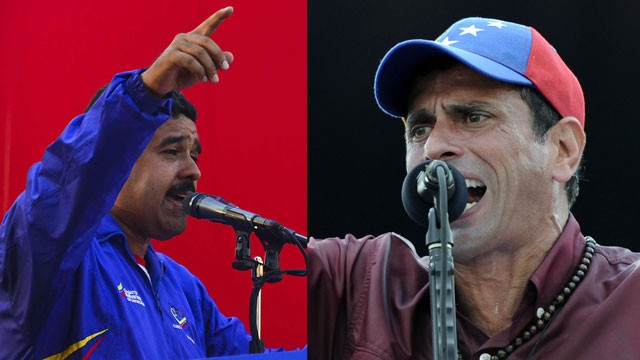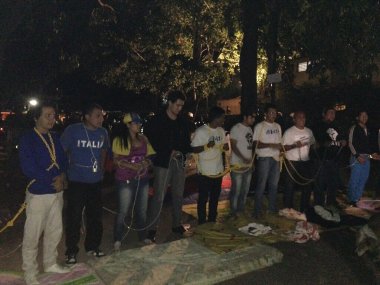151
Politics & Religion / Coverage of the press conference
« on: April 15, 2013, 12:24:50 PM »
Capriles refuses to concede Venezuela presidential election, demands recount

By Juan Forero, Monday, April 15, 12:52 PM
CARACAS, Venezuela - Nicolas Maduro, the longtime loyal lieutenant of the late President Hugo Chavez, celebrated his apparent narrow victory in the presidential contest Monday, even as opponent Henrique Capriles refused to concede and demanded a recount, citing 3,200 irregularities on the day of the vote.
Instead of the resounding victory that many pollsters predicted for Maduro, who had the sympathy vote after Chavez died last month following a battle with cancer, his government begins on a shaky foundation with a questionable mandate. The margin of victory was just 235,000 votes.
“I want to say to the candidate of the government, the loser today is you,” Capriles said in an emotional press conference called moments after Maduro declared victory at the presidential palace where Chavez had given rousing speeches celebrating election wins.
He said that Maduro had benefitted from a vast state get-out-the vote machinery that included last minute tactics to bring voters to polls – including reopening closed polling stations.
“We are not going to recognize the results until each vote of the Venezuelan people is counted, one by one,” said Capriles, 40, an energetic lawyer and governor of economically important Miranda state. The Venezuelan electoral system is automated, but each vote also produces a paper receipt that can be counted by hand, according to electoral regulations.
One of the rectors of the National Electoral Council, Vicente Diaz, had called for a hand count after the results of the election were released. And in his victory speech, Maduro said, “We’re going to do it.”
“We’re not afraid – let the boxes talk,” said Maduro, 50, referring to the cardboard boxes that hold ballots. “That the truth be told.”
Still, on a tense Monday in which many businesses were shuttered, it remained unclear if a recount would take place.
The government continued with plans for a ceremony on Monday afternoon in which Maduro would be proclaimed the winner, to be followed days later by a swearing in ceremony. And the electoral council – which has five members, the majority of whom are allies of the government – had not said whether a recount would take place.
“These are the irreversible results that the Venezuelan people have decided with this electoral process,” Tibisay Lucena, the head of the council, said late Sunday as she read the results.
According to the council, voters gave Maduro 50.6 percent of the vote to 49.1 for Capriles, with 99 percent of the vote counted. It was unclear, though, if the Venezuelan vote from outside of the country – which analysts say is overwhelmingly opposed to Chavez – were included in that total.
In Washington, White House spokesman Jay Carney called Capriles’s request for an audit of votes an “important, prudent, and necessary step” to ensure that Venezuelans have trust in the election results.
The narrow margin was a letdown for many in Chavismo, the radical movement that Chavez founded, with the goal of turning Venezuela into a socialist state.
http://www.washingtonpost.com/world/the_americas/capriles-refuses-to-concede-venezuela-presidential-election-demands-recount/2013/04/15/4db19c9e-a5eb-11e2-a8e2-5b98cb59187f_story.html

By Juan Forero, Monday, April 15, 12:52 PM
CARACAS, Venezuela - Nicolas Maduro, the longtime loyal lieutenant of the late President Hugo Chavez, celebrated his apparent narrow victory in the presidential contest Monday, even as opponent Henrique Capriles refused to concede and demanded a recount, citing 3,200 irregularities on the day of the vote.
Instead of the resounding victory that many pollsters predicted for Maduro, who had the sympathy vote after Chavez died last month following a battle with cancer, his government begins on a shaky foundation with a questionable mandate. The margin of victory was just 235,000 votes.
“I want to say to the candidate of the government, the loser today is you,” Capriles said in an emotional press conference called moments after Maduro declared victory at the presidential palace where Chavez had given rousing speeches celebrating election wins.
He said that Maduro had benefitted from a vast state get-out-the vote machinery that included last minute tactics to bring voters to polls – including reopening closed polling stations.
“We are not going to recognize the results until each vote of the Venezuelan people is counted, one by one,” said Capriles, 40, an energetic lawyer and governor of economically important Miranda state. The Venezuelan electoral system is automated, but each vote also produces a paper receipt that can be counted by hand, according to electoral regulations.
One of the rectors of the National Electoral Council, Vicente Diaz, had called for a hand count after the results of the election were released. And in his victory speech, Maduro said, “We’re going to do it.”
“We’re not afraid – let the boxes talk,” said Maduro, 50, referring to the cardboard boxes that hold ballots. “That the truth be told.”
Still, on a tense Monday in which many businesses were shuttered, it remained unclear if a recount would take place.
The government continued with plans for a ceremony on Monday afternoon in which Maduro would be proclaimed the winner, to be followed days later by a swearing in ceremony. And the electoral council – which has five members, the majority of whom are allies of the government – had not said whether a recount would take place.
“These are the irreversible results that the Venezuelan people have decided with this electoral process,” Tibisay Lucena, the head of the council, said late Sunday as she read the results.
According to the council, voters gave Maduro 50.6 percent of the vote to 49.1 for Capriles, with 99 percent of the vote counted. It was unclear, though, if the Venezuelan vote from outside of the country – which analysts say is overwhelmingly opposed to Chavez – were included in that total.
In Washington, White House spokesman Jay Carney called Capriles’s request for an audit of votes an “important, prudent, and necessary step” to ensure that Venezuelans have trust in the election results.
The narrow margin was a letdown for many in Chavismo, the radical movement that Chavez founded, with the goal of turning Venezuela into a socialist state.
http://www.washingtonpost.com/world/the_americas/capriles-refuses-to-concede-venezuela-presidential-election-demands-recount/2013/04/15/4db19c9e-a5eb-11e2-a8e2-5b98cb59187f_story.html





